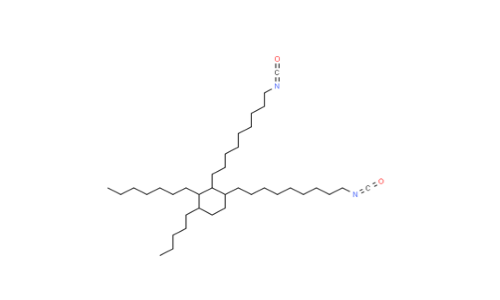Dimeryl Diisocyanate (DDI) is an aliphatic diisocyanate that displays very promising properties. Some of these are lower toxicity, lower vapour pressure, and increased insensibility to moisture. DDI has a CAS number of 68239-06-5 and can also be identified as 2-heptyl-3, 4-bis (9-isocyanatononyl)-1-pentylcyclohexane. Dimeryl Diisocyanate has a molecular formula of C38 H70 N2 O2.

| CAS Number: | 68239-06-5 |
| UN Number: | None |
| Hazard Class: | None |
| Packing Group: | None |
Physical properties of Dimeryl Diisocyanate
Safety information for Dimeryl Diisocyanate
All the safety information for Dimeryl Diisocyanate can be found in our MSDS (material safety data sheet). It includes information on first aid, accidental release, fire-fighting, handling and storage, personal protection and much more. Please familiarise yourself with the hazards before handling it.
FAQs
Dimeryl Diisocyanate is utilised in various applications, including chemical production, analytical chemistry, laboratory synthesis, and industrial processes. Its versatility makes it valuable for diverse uses in these fields.
Dimeryl Diisocyanate is not categorised with specific ratings on the HAZMAT scale due to its perceived low level of danger. However, this does not negate the presence of associated hazards.
Individuals handling this substance are strongly advised to take precautions to prevent any contact with their eyes and skin, as it can lead to significant irritation. In the event of contact with the eyes or skin, immediate rinsing of the affected area is crucial, followed by seeking medical advice.
Take these simple steps when handling and storing Dimeryl Diisocyanate to prevent any injuries, or damage to the eyes in particular.
- Prevent contact with skin and eyes.
- Wash hands and exposed body parts thoroughly after handling.
- Use personal protective equipment (PPE) as per Section 8.
- Observe valid legal regulations on safety and health protection.
Storage:
Keep away from sources of ignition – no smoking. Take precautionary measures against static discharge.
Keep the container tightly closed at all times. Store in a dry and cool place. If stored at temperatures higher than 15 C, the shelf life of the product may be reduced.
Dispose of Dimeryl Diisocyanate in compliance with local and/or national regulations. Adhere to waste disposal guidelines and refrain from pouring unused product into drainage systems, surface water, or groundwater. Entrust waste disposal to an authorised waste removal company. Empty containers may be recycled after proper cleaning.
Similar precautions should be followed for the safe handling, storage, and disposal of Magnesium Nitrate Hexahydrate. Always prioritise adherence to safety protocols and regulations to safeguard both individuals and the environment.
We customise shipping solutions to suit your Dimeryl Diisocyanate orders, taking into account specific requirements like quantity and destination. The East Harbour Group team offers personalised quotes to ensure an optimised supply chain and logistics process. Whatever your specific needs may be, share them with our sales team, and we will make every effort to accommodate them.
Yes. From Australia to Austria, we have the logistics knowledge and know-how to ship your chemicals where you need and on time. If you need Dimeryl Diisocyanate delivery and are unsure of logistics choices, contact us today.
Dimeryl Diisocyanate is not on the HAZMAT scale.
IF YOU WANT TO LEARN MORE ABOUT HOW EAST HARBOUR GROUP LTD CAN HELP YOUR BUSINESS, GET IN TOUCH.
